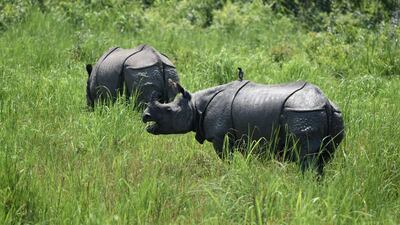MUMBAI // A fierce debate is raging over whether forest rangers in India should be allowed to shoot poachers of endangered species, as a national park in the north of the country recently became the latest to allow guards to fire at such criminals.
Authorities at the Corbett Tiger Reserve in Uttarakhand state on Wednesday issued “shoot on sight” orders to its rangers who identify armed poachers during the course of a five-day operation. Hundreds of camera traps – which alert guards when an intruder is detected – have been set up and 150 rangers deployed as part of the operation, as the reserve steps up efforts to protect its tigers.
The question of how far India should go in its battle against poachers came into focus earlier this month after the worldwide airing of a BBC documentary called Killing For Conservation. The news organisation said the report exposed the "dark secrets" of Kaziranga National Park in the north-eastern state of Assam, which is home to the endangered one-horned rhino, claiming that rangers at the park were encouraged to shoot any poachers – armed or unarmed. Figures provided by the park to the BBC showed that 23 poachers had been killed there in 2015.
Critics of the “shoot on sight” policy argue against what they see as the militarisation of conservation and giving rangers the power to carry out extrajudicial killings of poachers, and warn of the risk of killing or maiming innocent victims. Some conservationists, however, say tough measures are necessary to protect India’s endangered species and that rangers need to be able to protect themselves against armed poachers.
“If the forest guards were not armed and those powers were not given in Kaziranga, we would not have the Indian one-horned rhino alive today,” said Trishant Simlai, a conservation scientist from Pune, western India.
“Poaching is a huge problem in India and the demand for rhino horn is so high that the threat to rhinos is always going to be there.”
Rhino horn and tiger bones, both widely used in Chinese traditional medicine, fetch vast sums of money in China and Vietnam. A kilogram of rhino horn can be sold for tens of thousands of dollars. Tiger skins similarly fetch vast sums.
But, Mr Simlai added: “A certain amount of policing is necessary, but then at what point do you draw the line? How much power do you give and how do you make sure that that power is not abused?”
Dharmendra Khandal, a conservation biologist for Tiger Watch, an NGO that combats poaching at Ranthambore National Park in the northern state of Rajasthan, said such decisions should be left up to individual forest authorities.
“In areas like Kaziranga, they are difficult areas and there are extremists there. In Ranthambore and many other reserves shoot on sight is not possible – millions of people use the forests for grazing their animals and other purposes,” he said.
The numbers show that Kaziranga’s conservation efforts have been successful, with the park having the largest population of one-horned rhinos in the world – about 2,400.
But despite the rangers' powers to shoot poachers, rhinos are still being killed at the park. Earlier this month, India's The Telegraph newspaper reported that a rhino had been found dead in the park with her horn removed, having been killed by AK-47s.
The Wildlife Protection Society of India has recorded four tiger killings by poachers this year, and 50 such deaths last year.
Survival International, a UK-based human rights group, describes “shoot on sight” policies as “brutal” and says 50 people were “executed” by rangers at Kaziranga in the past three years.
It is concerned such policies will be implemented by increasing numbers of national parks in India, and believes this could encourage violence against the country’s tribal people, many of who live around national parks.
“It’s time for a global outcry against extrajudicial killing and torture in the name of conservation,” Survival International says. “It wouldn’t be tolerated in any other field and it should be loudly condemned by all those who care about human rights and the environment.”
The organisation cites the example of a seven-year-old boy called Akash Orang from one of the tribes in the Kaziranga area. It says he was shot at and maimed by rangers last year, which led to him being hospitalised for five months.
Kaziranga officials responded to the BBC documentary by claiming the park did not have a “shoot on sight” policy but that its guards have legal immunity if they kill a poacher.
Mr Simlai said there were cases where rangers’ powers had been “misused” in Kaziranga, similar to the misuse of power found in “any policing force in India – the police force, the armed forces”.
Mr Khandal said “a carrot and stick” approach had to be used to tackle poaching, including helping poachers or would-be poachers to find alternative livelihoods.
Worryingly, while high-profile efforts are helping to control the killing of India’s tigers and rhinos, the poaching of other animals, such as leopards and pangolins, is on the rise, he said.
“Poachers are shifting to other animals.”
foreign.desk@thenational.ae

